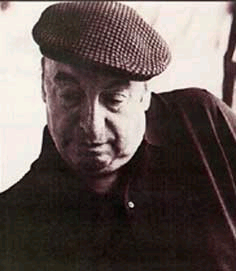Ode to Neruda
The world marks the 100th anniversary of one of the most famous poets of the XXth Century. But the Chilean giant, who won the Nobel Prize for Literature in 1971, was also a militant, a passionate communist who lived for his ideas.

Pablo Neruda wrote about Lenin some day in 1957:
“Lenin, to write about you, I have to leave words aside. I have to write with trees, wheels, plows and crops”. Today, when the world marks the 100th anniversary of Pablo Neruda's birth, the same symbols can be used to talk about who, as Lenin, was a man of his times. Pablo Neruda, the Chilean poet who won the Nobel Prize for literature in 1971, was much more than a writer, he was a passionate militant of his ideas.
During his lifetime, Pablo Neruda counted Pablo Picasso and Diego Rivera as close friends and was so politically active that he became a senator for the Communist Party in his native Chile. Following a remarkable tradition in Latin America’s foreign service to appoint prominent culture figures to high diplomatic posts, Neruda was in charge, between 1927 and 1935, honorary consul, in several cities as which took him to Burma, Ceylon, Java, Singapore, Buenos Aires, Barcelona, and Madrid. The civil war in Spain inspired to poet him to turn to the political issues, and in 1937 he wrote "Espana a en corazon" ("Spain in the Heart").
Since then, Neruda joined the leftist movement and became a prominent member of the Chilean Communist Party. He became Senator in the forties, as used his position to back anti-fascist Soviet struggle.
In 1950 Neruda won the international Lenin prize for peace between nations in Moscow. Three years later, the poet returned home and was involved in literary and party work. In 1971 President Salvador Allende (1908-1973), the first Socialist President ever elected in Latin America, appointed Pablo Neruda Chile's ambassador to Paris, but two years later the poet resigned from this post and died shortly after a bloody military cup led by Gen. Augusto Pinochet and plotted by the CIA ended with the dreams of millions of Chileans about a future in prosperity and peace.
 To talk about Neruda is to talk about a marvelous poet and also about a man who offered his life for the cause of freedom and peace. While re-reading Neruda’s Ode to Lenin one can say that history played an awful trick to one of his most beloved sons. Lenin is no more the father of the invincible revolution; the Soviet Union no more, as well. But Neruda’s “Ode to Lenin” is still there, as the dreams of millions who want to leave in peace, without fearing of the future.
To talk about Neruda is to talk about a marvelous poet and also about a man who offered his life for the cause of freedom and peace. While re-reading Neruda’s Ode to Lenin one can say that history played an awful trick to one of his most beloved sons. Lenin is no more the father of the invincible revolution; the Soviet Union no more, as well. But Neruda’s “Ode to Lenin” is still there, as the dreams of millions who want to leave in peace, without fearing of the future.
That's perhaps the most important legacy of Neruda: his love for life, his love for the common people in a world that usually forgets about them, and now kills them in preventive wars.
Subscribe to Pravda.Ru Telegram channel, Facebook, RSS!





